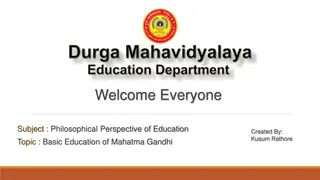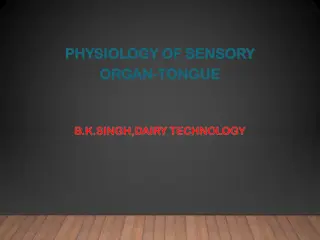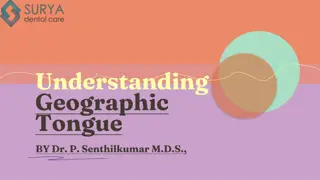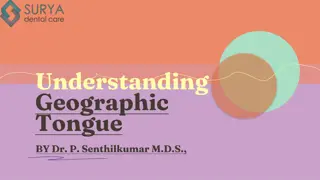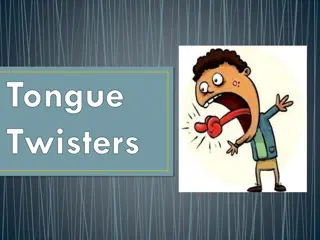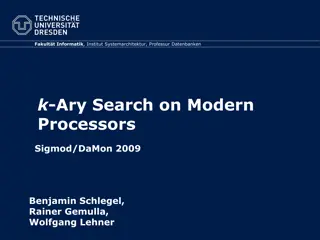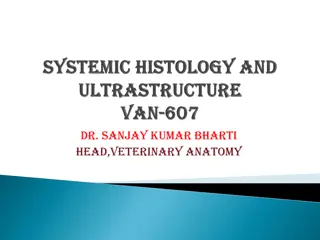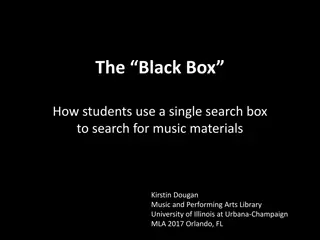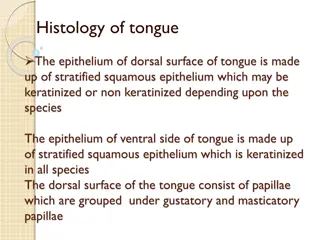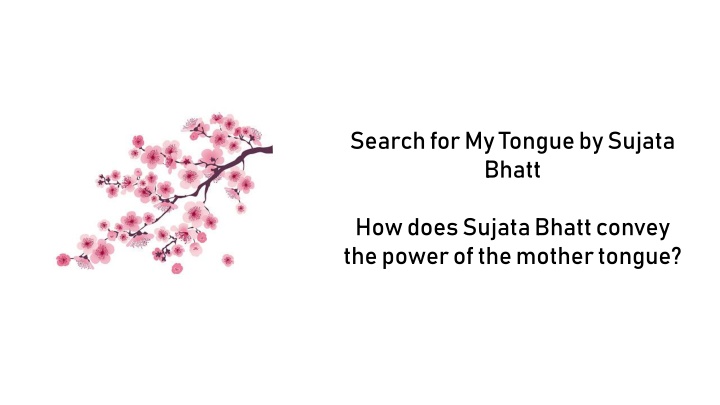
Power of Mother Tongue in Sujata Bhatt's Poetry
Sujata Bhatt explores the struggle of maintaining her mother tongue, Gujarati, while adapting to a new language in her poem "Search for My Tongue." Through vivid imagery and emotional depth, Bhatt conveys the power and resilience of the home language despite external pressures.
Download Presentation

Please find below an Image/Link to download the presentation.
The content on the website is provided AS IS for your information and personal use only. It may not be sold, licensed, or shared on other websites without obtaining consent from the author. If you encounter any issues during the download, it is possible that the publisher has removed the file from their server.
You are allowed to download the files provided on this website for personal or commercial use, subject to the condition that they are used lawfully. All files are the property of their respective owners.
The content on the website is provided AS IS for your information and personal use only. It may not be sold, licensed, or shared on other websites without obtaining consent from the author.
E N D
Presentation Transcript
Search for My Tongue by Sujata Bhatt How does Sujata Bhatt convey the power of the mother tongue?
Sujata Bhatt and Search for my Tongue Bhatt was born in Gujarat, India, in 1956. In 1968, her family emigrated to America where she studied and lived most of her life. She is an accomplished poet who has received the Commonwealth Poetry Prize. She has translated Gujarati poetry by other writers into English. Much of her own poetry combines both the Gujarati and English Languages. In 2013 she became the Visiting Professor of Creative Writing at Nottingham Trent University. The extract is part of a longer poem which was inspired by her time studying English in America. She was concerned that her immersion in the English language might mean that she would lose her Indian identity. Bhatt writes: I have always thought of myself as an Indian who is outside India That s the deepest layer of my identity. The poem voices the poet s anxiety that she is losing her mother tongue Gujarati. She wonders if by living exclusively in one language, she will find her other voice will rot and die. However, she then dreams in Gujarati. These words are translated in the final section of the extract, where she expresses that her mother tongue cannot be destroyed.
How does Sujata Bhatt convey the power of the home language?
Search for my tongue Verb search we search when we have lost something Noun tongue how can you lose your tongue? Your voice?
1. The struggle of having two tongues Verb lost an interesting phrase but is referring to mother language Direct address: You ask me Seemingly the poet is engaged in conversation. Tone is quite confrontational to reflect her anxiety. 1 2 3 4 5 6 7 8 9 10 11 12 13 14 15 16 17 You ask me what I mean By saying I have lost my tongue. I ask you, what would you do If you had two tongues in your mouth, And lost the first one, The mother tongue, And could not really know the other, The foreign tongue. You could not use them both together Even if you thought that way. And if you lived in a place you had to Speak a foreign tongue, Your mother tongue would rot, Rot and die in your mouth Until you had to spit it out. I thought I spit it out But overnight while I dream, Short line: the mother tongue distinguishes the struggle of the poet to keep her mother tongue her home language. Adjective mother has connotations of nurture, familiarity, comfort. Modal verb: could not the poet is struggling to learn the foreign tongue. The poet also does not think she can use both tongues together she can t speak both simultaneously so she always has to choose. This is contrasted with had to to reinforce feelings that she must use the foreign tongue. Juxtaposed: the foreign tongue the language that is new the language of the place she resides. Adjective foreign has connotations of unfamiliarity, something that is alien and strange and not comfortable. Verb spit reinforces the idea that she has no choice but to get rid of it. In living where she must use a foreign tongue, she feels she has to reject her mother tongue. Verb rot has connotations of decay. Her fear is that she is losing her mother tongue. This is reinforced by the verb die . Using an image of something rotting and decaying in our mouth is a shocking image but helps to convey the anguish she is feeling as she feels her mother tongue is doing just that. Conjunction And she is running through her thoughts quickly in a state of anxiety. Conjunction But change in tone because whilst she dreams, her mother language returns to her all is not lost.
1. The struggle of having two tongues The lines alternate words in Gujarati and phonetically spelt words which express how to pronounce them out loud. She is showing us that her mother tongue is irrepressible. She is also inviting the readers to speak with her tongue in their mouth. She is inviting people to feel what it might be like to be bi-lingual. This is a celebratory moment her mother tongue returns to her when she sleeps. The next stanza is a translation of the words being expressed here.
1. The struggle of having two tongues Noun stump of a shoot although it begins tiny, it will soon grow Verb: grows juxtaposed with the rot and decay of the previous stanza. It is returning to life Repeitition: grows longer, grows moist, grows stronger veins expresses the pace of the plant maturing. Particularly interesting is stronger veins the connections will deepen and she will remember more. With every grow, it gets stronger. 32 33 34 35 36 37 38 39 It grows back, a stump of a shoot Grows longer, grows moist, grows strong veins, It ties the other tongue in knots, The bud opens, the bud opens in my mouth, It pushes the other tongue aside. Everytime I think I ve forgotten, I think I ve lost the mother tongue, It blossoms out of my mouth. Extended metaphor: bud A bud is the closed flower of a plant. The bud opens means it is starting to bloom. It re- establishes itself and finds a place inside her mouth. Line: It ties the other tongue in knots encapsulates this strength. It grows back so strong that it pushes the foreign tongue back and silences it. Verb blossoms final beautiful image. Blossom is the most lovely part of a tree; it opens in spring time and represents new life, hopefulness and youth. Her cultural identity, her mouth tongue will never be destroyed. Time reference Everytime the poet reminds herself not to fear losing her mother tongue because it always returns.
How does Sujata Bhatt convey the power of the mother tongue? The fact she worries over losing it shows how much she cares for her mother tongue and desires to use it Her confrontational tone at the start of the poem reinforces this. She runs through the dilemma as she sees it The middle stanza, written in her mother tongue, is beautiful and forces us to pause to understand her situation. The extended metaphor of flowering shows that it hasn t left her and will continue to blossom It will establish stronger veins and remain with her.


